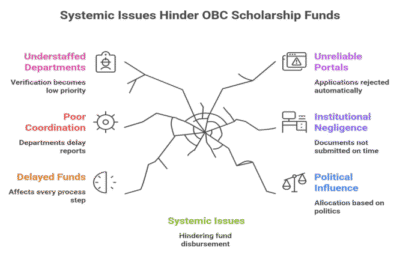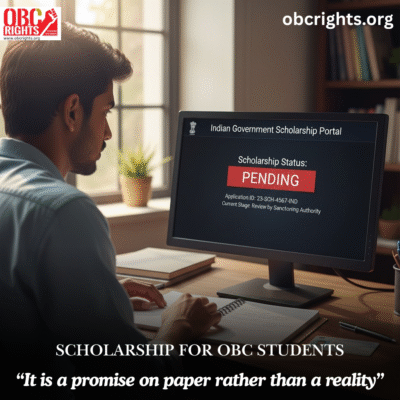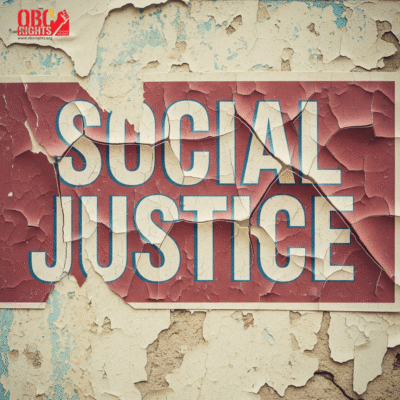Every year, thousands of students apply for government aid with the hope of easing their financial struggles. Yet, for many, the scholarship for OBC students remains a promise on paper rather than a reality. The scheme was designed to support those from socially and economically weaker backgrounds, ensuring that no one is denied education because of poverty. But despite of the ruling government’s tall claims, the actual delivery of funds continues to be riddled with gaps. The problem isn’t a lack of policy, it’s the way the system functions beneath it and the real commitment of the ruling government.
The Purpose Behind the Scholarship for OBC Students
The scholarship for OBC students was introduced to promote equality in education. It covers tuition fees, living expenses, and other academic costs, giving students from backward classes a fair chance to compete. Central and state governments jointly manage these programs, such as the Pre-Matric and Post-Matric Scholarships.
However, while the objective is clear, the path to execution is full of obstacles. From delayed fund transfers to bureaucratic confusion, systemic inefficiencies have quietly undermined one of India’s most important social welfare programs.
The Systemic Reasons Why Funds Don’t Reach Students
1. Delayed Fund Release and Budget Bottlenecks
Many states depend on the central government’s share of funds. When the release of money is delayed at the central level, it affects every step of the process. Budget approvals, audits, and fund transfers often happen months later than planned, leaving students waiting indefinitely.
2. Poor Coordination Between Departments
The OBC scholarship involves multiple departments – social justice, finance, and education. If one department delays its report or utilization certificate, the next stage stalls. The chain is long, and every weak link adds months to the process.
3. Lack of Dedicated Staff and Accountability
Welfare departments that handle these schemes are often understaffed. Officials manage several unrelated projects simultaneously, and scholarship verification becomes a low priority. Without accountability, files simply move in circles until deadlines pass.
4. Unreliable Digital Portals
Online systems were meant to make things faster, but in many states, portals malfunction frequently. Data mismatches, slow servers, and failed Aadhaar verification cause applications to be rejected automatically—even when students have provided all correct details.
5. Negligence at the Institutional Level
Colleges and schools play a crucial role in verifying applications. Unfortunately, many fail to submit the required documents on time or neglect to upload utilization certificates. This leads to funds being withheld at the state level, and the students bear the consequences.

In the Middle of the Maze: Politics and Power Dynamics
Even in states with better systems, the scholarship for OBC students faces deeper challenges tied to political priorities. In some regions, fund allocation is influenced by political considerations rather than need. Districts or colleges with stronger political representation often receive faster clearances, while remote or less influential areas face long delays.
At times, the scholarship becomes part of vote-bank politics, announced loudly during election seasons but quietly ignored afterward. The focus shifts from consistent execution to short-term publicity. Without strict oversight, political interference distorts the very purpose of the scheme, turning it from an instrument of empowerment into a tool of convenience.
A System That Fails Its Own Promise
Beyond politics, the system’s inefficiencies continue to block the intended flow of funds. Manual verifications, missing transparency, and poor communication between departments create a web of confusion. Very few states publish public dashboards showing how much money has been disbursed or how many students benefited.
The scholarship for OBC students, which should symbolize opportunity-often gets caught in bureaucratic traps. Students from low-income families lose faith in the system, believing that the schemes meant to empower them are just empty announcements.
Reforms That Could Change the Situation
- Simplify the Process: Reduce unnecessary verification layers and automate basic checks.
- Ensure Transparency: Public dashboards showing fund flow can rebuild trust.
- Fix Accountability: Designate responsible officers and penalize delays.
- Strengthen Awareness: Conduct regular outreach in rural and semi-urban regions.
- Independent Audits: Third-party evaluations can prevent misuse and political bias.
A Right, Not a Favor
Education is the foundation of equality. When scholarships fail to reach the students who need them most, it isn’t a small administrative mistake-it’s a systemic failure. The scholarship for OBC students is not a token of generosity; it is a rightful investment in India’s collective progress.
To make that right meaningful, transparency, accountability, and freedom from political interference are essential. The promise of social justice must not depend on power, connections, or luck – it must rest on fairness. Only then can every OBC student claim what is already theirs: a fair chance at education and a better life.
So, to the government and political leaders, a simple question must be asked:
If funds can be promised every year in the name of equality, why can’t they be delivered with the same sincerity?
Until that question is answered honestly, the real empowerment of OBC students will remain unfinished.



